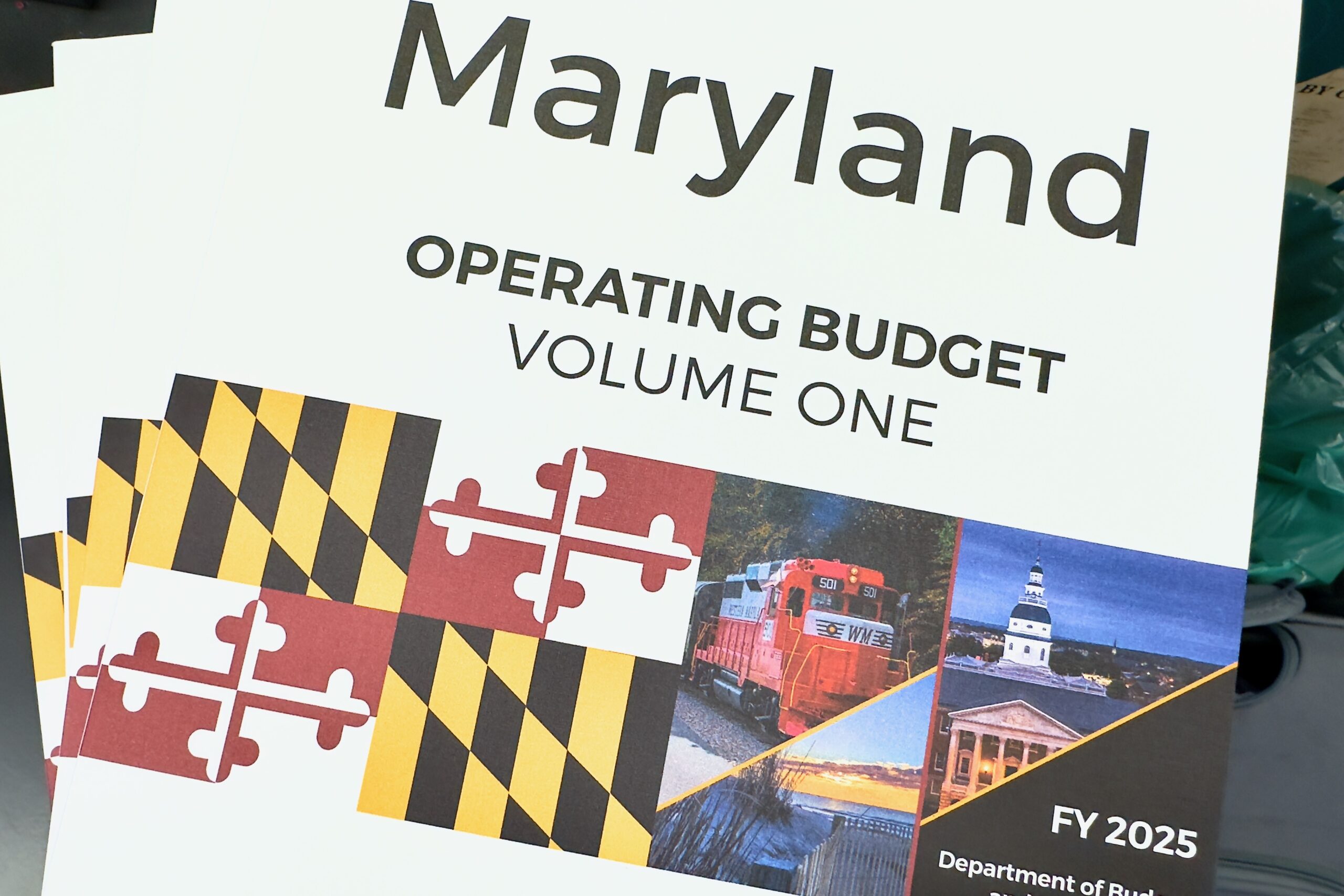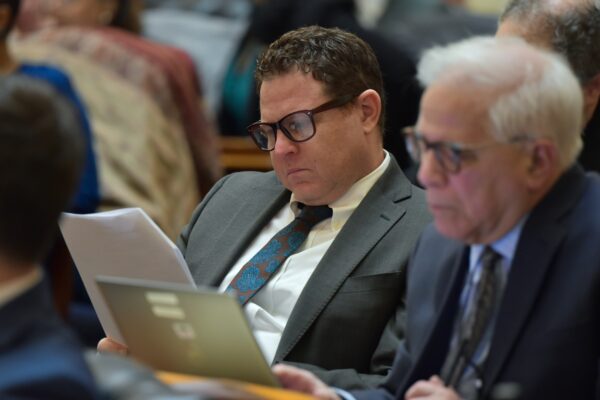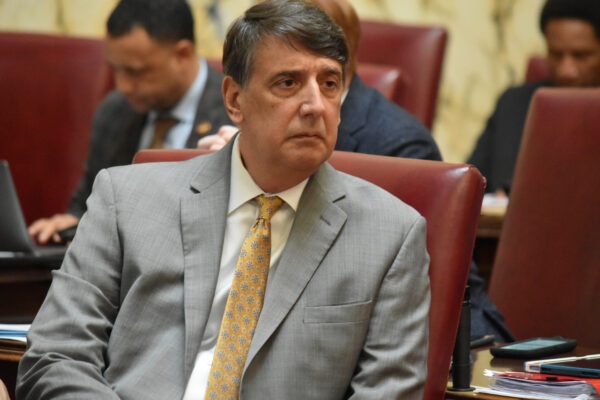House and Senate take sides on tax increases after revenue write-down

Disappointing news from a key revenue panel is accentuating a difference in approach by the House and Senate on resolving looming budget gaps.
The Board of Revenue Estimates Thursday revised its fiscal 2024 and 2025 estimates down by $120 million and $134.9 million respectively from its December forecast. The news, which represents a mostly flat revenue estimate, comes as the Maryland Senate is about to begin budget debates.

House Appropriations Chair Ben Barnes (D-Prince George’s and Anne Arundel). Photo by Bryan P. Sears.
“Essentially what this $250 million write-down means is that this budget is out of balance,” said House Appropriations Chair Ben Barnes (D-Prince George’s and Anne Arundel).
Hours before the new estimates were announced, Senate Budget and Taxation Chair Guy Guzzone (D-Howard) presented a more laid-back attitude to what would be the revenue panel’s fifth consecutive downgrade of projected state revenues.
Guzzone, speaking Thursday morning, said that while he did not yet know the exact amount of the revenue written down, it would be of “significance, but by the same token an amount that we have been planning for and working into the budget. The committee is well aware of this.”

Senate Budget and Taxation Chair Guy Guzzone (D-Howard). Photo by Bryan P. Sears.
“The budget that we present tomorrow will be balanced with a good shape,” said Guzzone. “Most importantly, as I know that is so important to all of us, is that I believe it will continue to reflect the values that we all hold dear.”
Guzzone, speaking to reporters Thursday morning, said the Senate version of the budget offsets the revenue decreases announced later that day. Primarily, the plan calls for tapping a fund of larger than expected capital gains taxes.
Guzzone and Senate President Bill Ferguson (D-Baltimore City) have been steadfast in their resistance to major tax increases this year.
Barnes and House Ways and Means Chair Vanessa Atterbeary (D-Howard) used the write-down as a springboard to renew their call for passing measures to increase revenue.
Atterbeary, in a briefing with members of the Board of Revenue Estimates Thursday, characterized the avoidance of raising taxes as fiscally irresponsible and fearful.
“For too long around here, the phrase fiscal responsibility has been used to justify taking cuts,” she said. “More recently, it has been used not to address a looming issue seemingly out of fear.”
Republicans in the House, who are outnumbered more than 2-1 that chamber, were quick to criticize the Democrat majority.
“There are many questions surrounding Maryland’s economy at this moment,” said House Minority Leader Jason C. Buckel (R-Allegany). “Our economic indicators and our tax data are telling different stories, calling into question the health of our overall economy. What we do know is that revenues indicating the health of Marylanders’ wallets — both sales and personal income taxes — are down. Families have less income and less money to spend. This is something the House of Delegates must be aware of as our Democratic colleagues seem hell-bent on increasing Marylanders’ tax burden.”
A ‘middle course’ hypothesis
Despite the news of a downward revision in revenues, projected collections for the current fiscal year are still expected to increase by about $850 million to more than $24.5 billion.
In fiscal 2025, the revenue panel projects state revenue will flatten year over year, growing by more than $260 million year over year, or about 1%.
The continued declines are thought to be a product of many factors including a continued reset of the economy after a burst of federal pandemic spending.
And while the state continues to boast one of the lowest unemployment rates in the nation, Maryland has one of the lowest post-pandemic labor participation rates and is 4 percentage points below where it was before the pandemic.
Still, the panel expressed concerns about conflicting messages from state income tax withholding and economic and job data.
“Specifically, our reporting income tax data showing a greater slowing down in our revenues than our economic data,” said Director of the Bureau of Revenue Estimates Robert Rehrmann. “Our economic data is not showing any worrying trend or a recession or a break in our employment.”
Rehrmann said the board chose a “middle course” between the two conflicting sets of data.
Comptroller Brooke Lierman called the estimate “a hypothesis” and Rehrmann warned of “downside risk” in the panel’s estimates.
“If that recording income tax data continues to go on a downward trend, we may have a situation where revenues will be less than we anticipate,” he said.
Danger signs were there
The state faced a growing revenue crisis before the release of the latest estimates.
House Majority Leader David Moon (D-Montgomery) in December set the stage for a fight with the Senate over taxes. Moon told a gathering of county officials in Cambridge that the House was prepared to “pull up some grown-up pants and do something.”
A month later, legislative budget analysts projected that gap between revenues and spending would balloon to $3 billion in the coming years.
This year alone, lawmakers are wrestling with hundreds of millions in structural budget deficits.
The Senate Budget and Taxation Committee is expected to finalize its version of Gov. Wes Moore’s proposed $63 billion fiscal 2025 budget this week. The bill would come before the full Senate next week.
Next year, the deficit is projected to reach $1 billion, according to legislative analysts. In fiscal 2027, the last year of Moore’s term, it would grow to $1.3 billion. A year later, it would more than double to $3 billion — about 12% of the general fund revenues projected for that year.
The deficit projections are the largest since the Great Recession, those analysts said in January.
Not included in the analysts’ projection is a separate $3.1 billion gap in the state’s Transportation Trust Fund over the next five years. Moore and Transportation Secretary Paul Wiedefeld warned of draconian cuts to every jurisdiction in the state without increased funding.
Since the introduction of Moore’s budget, lawmakers have learned of a miscalculation by the Moore administration that underestimated the costs of Medicaid expenses by $236 million.
Guzzone told reporters Thursday that the Senate has solved the Medicaid error.
“The Medicaid is an entitlement,” he said. “So Medicaid doesn’t have to actually be brought into the budget per se, because as an entitlement, it’s really an estimate of what might happen in the future. So, in that case, we’re giving the governor the authority to use the rainy-day fund up to a certain level to handle it as it may manifest itself during the year.”
A risk of broken promises
The larger projected future deficits are driven by the costs of the landmark Blueprint for Maryland’s Future. By fiscal 2028, the costs of that education reform plan outstrip the funding in a dedicated account. The state will have to rely on more general fund revenues to close the gap.
The situation was expected when the General Assembly passed the plan in 2020. Lawmakers at the time took a short-term approach, saying the plan was paid for in the initial years even as the most expensive parts of the program had yet to be implemented.

House Ways and Means Chair Del. Vanessa Atterbeary (D-Howard). File Photo by Bryan P. Sears.
Atterbeary said the cost of not finding those revenues now would mean cuts to those parts of the program.
“We can either give up on the commitments we have made — and I will say again specifically to our children and to our teachers — or we can fix this problem,” Atterbeary said.
Moore’s budget contains no tax major revenue increases. It also does not address future shortfalls, according to legislative analysts.
In comments to reporters last week, Moore said he saw no need for tax increases for now
“We’re always going to continue really digging into the numbers and digging into the data,” the governor said. “We’re always going to make the decisions that we’re going to be both fiscally responsible and also address the moment. I just do not believe right now that raising taxes is something we have to do.”
Asked if that position would hold beyond the current year, Moore responded:
“I have not seen anything yet in the way that the budget has rolled out that would move me from that position,” Moore said.




 Creative Commons Attribution
Creative Commons Attribution